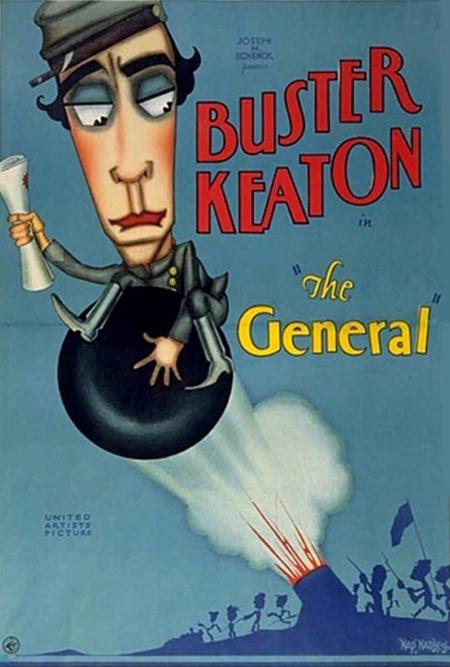Rating of
4/4
The General
SteelCity99 - wrote on 04/21/18
Comedy is subjective. Specifically talking about the art of cinema, the very first face that comedy adopted is the slapstick subgenre. What are the main characteristics of slapstick comedy? Intelligent gags, violence-oriented hyperactivity, action humor, exaggerated facial expressions, comical characters and hilarious, nonsense dialogues. Most of the times, however, especially during the silent era, such stories were addressed with romance. Romance served the purpose of appealing peaceful audiences and, most of the times, for strengthening the audaciousness and characteristic motivations of the main character, decisions that would lead him to a memorable climax and a demanding happy ending. Charles Chaplin understood it; Harold Lloyd and his several directors applied the aforementioned concepts; the Marx Brothers took those measures to an extreme. Buster Keaton's The General shared all of these characteristics and added one more: his definitive and now legendary masterpiece constituted a direct criticism towards the futility and ultimate senselessness of war. However, this plot-wise courageousness was addressed, precisely, with the slapstick subgenre, being a landmark comedy film rather than a controversial one.
The General is the famously humorous story of Johnnie Gray who has two great loves: his girl named Annabelle Lee and his Confederate train named "The General". When the Civil War begins, he is unable to enlist in the Confederate army since his officer considers him more valuable for the South as an engineer. After Annabelle considers him as a coward for not enlisting, the Union steals The General in order to supply Unionists in a sneak attack against the Confederates. Unbeknownst to them, they stole the train while Annabelle Lee was on board. Now, it is up to Johnnie Gray to rescue the two great loves of his life and, latterly, warn the Confederates. The film was awarded the National Film Registry at the National Film Preservation Board, USA in 1989.
The General has several remarkable talents: it is intelligent, humorous, creative and hyperactive. Johnnie Gray, hilariously interpreted by the comedy genius Buster Keaton, represents the patriotic American that the standard citizen would yearn for becoming. Once again, we are introduced to a character that is involuntarily drawn into an unbelievable and involuntarily funny series of events, thus emphasizing the purposelessness of a devastating event such as a war. His beloved girl, perhaps the most tender and lovably dumb woman in cinema history, contrary to the past's popular opinion, does not degrade women. She is naive, weak and careless, but dedicated, loyal and romantically submissive. If we put a duo of such caliber together, the result is an insane ride full of positivism, endless fun and perfectly planned gags.
There are several sequences that make of this film an antiwar statement, most of them represented through the character of the never-smiling Keaton. The motivations behind his persona that urge him to enlist are not related to his peaceful and undeniably careless personality. He is just seeking for the attention of Annabelle and for obtaining a patriotic status, perhaps for the sake of happiness and self-esteem. Also, at some point, the character coincidentally finds a house, breaks into it in order to find food, and finds out that the house is being used by Unionists as a base of operations. This makes Johnnie Gray to hide under the table, learning the details about the next plot they are planning against the Confederates. Quite obviously, the nature of the film demanded a character that sought for good once he has involved in the army in a way he had never anticipated. Along with Annabelle, they start a new mission. Most of the comedy can be found in the fact that the film employs most of the time in showing Johnnie protecting Annabelle from any possible harm. The genius of Keaton (and Chaplin) always applied a certain danger degree to the most innocuous and inoffensive objects possible, almost transforming a seemingly peaceful surrounding into, ironically, a war zone.
The editing is very smart and precise, calculating the best possible angles for transporting us into the middle of the action, making us board The General and inviting us to an action-oriented journey of Unionist and Confederate lunacy. Performing incredible and nearly-impossible stunts throughout, the story culminates in one of the most memorable climatic war sequences. We are not compelled to sympathize with the characters; such effect is incredibly accomplished with the pace alone. Also, the genius concept of constructing and latterly unfolding a precise character development with a slapstick environment enhances the film's talent. It is not until the protagonists encounter a ferociously dangerous situation when we get the opportunity to build a schematic map of their personalities through the analysis of their hilarious and intentionally unrealistic reactions. The musical score and the cinematography achieved a very satisfying audible and visual balance, since The General also required a high attention to detail and very elaborate, single shots.
The General is a timeless masterpiece of the comedy genre. Clyde Bruckman's direction was merged with Keaton's incomparable vision of vertiginous pace and sense of humor, and the result is an unforgettable, roller-coaster ride. The film constituting a social commentary was the main element that influenced legends of comedy to add substance behind their stories. Before this film, the genre focused exclusively on the slapstick humor of the stories and the character development, such as The Kid (1921) and Safety Last! (1923). Later on, films criticized authoritarian figures that caused poverty-stricken life conditions (City Lights [1931]), the shocking impact of the industrialization in the modern age (Modern Times [1936]) and totalitarian control derived from ambitious ideologies (The Great Dictator [1940]). The brilliance and originality of The General have and will remain eternally untouched, symbolizing the birth of a film branch and the inspiration of future filmmakers before resorting to intellectual humor, sexual references and unnecessary, crude sensibilities.
100/100




